#erp implementation
Explore tagged Tumblr posts
Text

💡 Transforming Healthcare with ERP Solutions 🏥 From improving patient care to making data-driven decisions, ERP is revolutionizing the healthcare industry. 💻✨ Streamline operations, cut costs, and empower your healthcare heroes with smart tech that puts patients first.
✅ Centralized Records ✅ Real-Time Tracking ✅ Smarter Staffing ✅ Better Outcomes
Let innovation lead the way in care. 💙
#HealthcareInnovation #ERPforHealthcare #DigitalHealth #HealthTech #SigzenSolutions #SmartHealthcare #MedicalTech #PatientCareFirst #HealthcareManagement #sigzentechnologies #erp #erpnext #erpsolution
#inventory management#erp implementation#business software#erpnext#manufacturing solutions#erp software solutions#businesssolutions
3 notes
·
View notes
Text
2 notes
·
View notes
Text
Why Engineering Companies Need Standard ERP Solutions for Successful Implementation
In today’s fast-paced manufacturing industry, the need to streamline operations, improve efficiency, and ensure growth is paramount. Businesses, especially in the engineering and manufacturing sectors, are turning to ERP software to manage their operations effectively. Enterprise Resource Planning (ERP) software is a game-changer for manufacturers looking to grow faster by integrating their processes and providing a comprehensive solution for resource management, decision-making, and scalability. If you are a manufacturer in India or a growing business in Bhopal, partnering with the right ERP software company in Bhopal could be the key to unlocking your potential. This blog explores the benefits of ERP software for manufacturers, the role of local ERP software providers in Bhopal, and why adopting ERP solutions is essential for success in today’s competitive landscape.
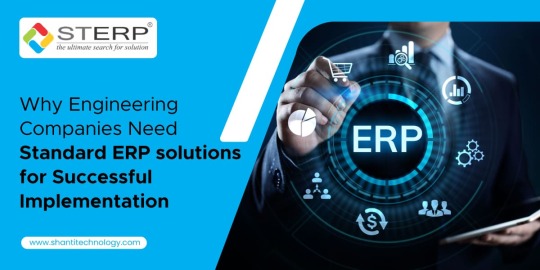
What Is ERP Software and Why Does It Matter?
ERP software is an integrated system that unifies core business processes such as procurement, inventory management, production planning, finance, and customer relationship management (CRM) into a centralized platform. This ensures seamless communication between departments, minimizes errors, and optimizes resource usage. For manufacturers, manufacturing enterprise resource planning solutions offer specific functionalities to address production scheduling, supply chain management, and quality control. These features are critical for scaling operations and improving overall business performance.
Benefits of ERP Software for Manufacturers
1. Centralized Operations
Manufacturers handle a wide range of tasks daily, from raw material procurement to final product delivery. ERP software integrates all these processes into a single platform, eliminating silos and ensuring real-time communication. Leading ERP software providers in Bhopal specialize in offering solutions tailored to manufacturing needs, ensuring smoother operations.
2. Enhanced Decision-Making
ERP systems provide accurate, real-time data through intuitive dashboards and analytics tools. This enables business leaders to make informed decisions, whether it is about production schedules, resource allocation, or financial forecasting. Engineering firms, in particular, can benefit from ERP software for engineering companies in India, which offers insights specific to their project-oriented workflows.
3. Optimized Resource Utilization
Effective resource management is critical in manufacturing. ERP software helps monitor and allocate raw materials, workforce, and equipment efficiently, reducing waste and ensuring optimal use of resources. By partnering with an engineering ERP software company in Bhopal, businesses can access customized solutions that cater to their unique requirements.
4. Improved Productivity
Automation of routine tasks, such as inventory tracking and order processing, frees up employees to focus on more strategic activities. This boost in productivity is a significant reason why manufacturers using ERP software for engineering companies experience faster growth.
5. Scalability
As manufacturing businesses grow, their operational needs become more complex. ERP systems are designed to scale with the organization, supporting additional locations, products, and services. Local ERP software companies in Bhopal provide scalable solutions that align with the growth trajectories of businesses in the region.
Why Bhopal Manufacturers Should Choose Local ERP Providers
Bhopal’s manufacturing and engineering sectors are thriving, thanks to its strategic location and growing industrial base. Local businesses stand to gain significantly by adopting ERP systems offered by experienced ERP software providers in Bhopal.
1. Tailored Solutions
Local providers understand the specific challenges faced by manufacturers in Bhopal and can customize solutions to meet their needs. For example, ERP software companies in Bhopal may offer modules tailored to local supply chains or compliance requirements.
2. On-the-Ground Support
Partnering with a local ERP software company in Bhopal ensures faster response times and personalized support during implementation and maintenance. This reduces downtime and ensures a smoother transition.
3. Cost-Effectiveness
Local ERP providers offer cost-effective solutions by eliminating the need for long-distance travel or remote troubleshooting. Businesses in Bhopal can enjoy world-class services without breaking the bank.
ERP Software for Engineering Companies in India
Engineering companies often deal with project-based operations requiring precise planning, tracking, and execution. ERP software for engineering companies in India is designed to address these needs, offering features like project management, resource scheduling, and cost tracking.
In Bhopal, collaborating with an engineering ERP software company in Bhopal ensures that local engineering firms have access to specialized solutions. These tools not only enhance operational efficiency but also improve project delivery timelines, leading to greater customer satisfaction.
ERP for Manufacturing Companies in India
India’s manufacturing sector is booming, driven by government initiatives and growing demand. To stay competitive, businesses must invest in advanced tools like ERP for manufacturing companies in India. These systems help manufacturers streamline production, manage supply chains, and maintain quality standards.
For manufacturers in Bhopal, adopting ERP software in Bhopal is a strategic move to keep pace with industry leaders. Features like real-time inventory management, production scheduling, and demand forecasting ensure businesses can respond quickly to market changes.
Real-Life Benefits of ERP Implementation
Manufacturers who implement ERP systems report:
Reduced Costs: By optimizing processes, ERP systems lower operational costs.
Faster Delivery: Improved production planning leads to quicker order fulfillment.
Better Quality: Automated quality checks ensure products meet customer expectations.
Businesses in Bhopal that have partnered with ERP software companies in Bhopal have experienced significant improvements in productivity, customer satisfaction, and revenue growth.
How to Choose the Right ERP Software Company in Bhopal
Selecting the right ERP provider is critical for a successful implementation. Here is what manufacturers should look for in an ERP software company in Bhopal:
Industry Expertise: Choose providers specializing in ERP software for engineering companies or manufacturing sectors.
Customization: Ensure the solution aligns with your unique business processes.
Local Presence: A local provider offers faster support and a better understanding of regional requirements.
Scalability: Opt for a system that can grow with your business.
Conclusion
ERP software is no longer a luxury but a necessity for manufacturers aiming to grow faster and compete effectively. By integrating operations, improving resource management, and enhancing decision-making, ERP systems empower businesses to achieve their goals. For manufacturers in Bhopal, collaborating with a trusted ERP software company in Bhopal ensures tailored solutions, cost-effectiveness, and reliable support.
Whether you are part of the engineering sector or a manufacturing enterprise, investing in manufacturing enterprise resource planning solutions will position your business for success in today’s dynamic market. Do not wait—explore the benefits of ERP software in Bhopal today and take the first step toward sustainable growth.
#ERP for manufacturing company in India#ERP implementation company in India#Best ERP implementation agecny#STERP#ERP software for engineering companies#Manufacturing enterprise resource planning#Rajkot#Surat#Ahmedabad#Gujarat#Maharashtra#Mumbai#Pune#Bhopal#Indore#Madhya Pradesh#ERP software for engineering companies in India#ERP integration#cloud ERP#ERP India#small business#ERP implementation
3 notes
·
View notes
Text
Seguridad
La seguridad informática en una Empresa que se encarga de realizar eventos es esencial para proteger la información sensible relacionada con la planificación, organización y ejecución de eventos.
Para esto indicare a continuación 8 pasos que se deben tener en cuenta:
1 Autenticación solida y control de acceso
2 Encriptación de datos
3 Actualizaciones y parches de seguridad
4 Sistema de detección de actividades sospechosas
5 Audotorias de seguridad regulares
6 Backup y recuperación de datos
7 Capacitación y concientización de los empleados
8 Gestión de proveedores
Esto con el fin de manterner salvagurdada la información de la organización, evitando programas maliciosos o virus que puedan afectar la operación.
IMPLEMENTACIÓN ERP
Para realizar la implementación de una ERP en la organización que se dedica a la realización de eventos a empresas de tecnologia, se debe tener en cuenta varios aspectos:
Se debe hacer una aevaluación de necesidades, donde se evidencie las areas que se quieren cubrir entre esas gestión de clientes, gestión de eventos, recursos humanos y contabilidad.
Investigar las soluciones de las ERP: Para esto se debe hacer una investigación de las ERP que estan en el mercado y seleccionar la que mejor se ajuste a las necesidades de la organización. entre esas esta SAP, Oracle, Eventpro, eventbrite entre otras.
Persoalización: Una vez se halla escogido la ERP que mejor se asocie a las necesidades de la empresa de eventos, esto puede requeriri la personalización de algunos modulos que se adapte al flujo de trabajo.
Implemenatación: Para esta etapa de la implemntación de la ERP se requiere migrar datos desde sistemas anteriores, en donde la capacitación del personal es escencial, para el uso del nuevo sistema, brindando herramientas de trabajo.
Pruebas: se realiza lo que conocemos como una prueba acida, en donde se evalua que el sistea funcione bien en caso de tener fallas se debe realizar las correciones pertinentes antes de hacer un lanzamiento oficial.
Lanzamiento: Una vez se halla determinado que el sistema funciona correctamente se realiza el lanzamiento oficial y de esta misma manera se estara apoyando el personal para abordar cualqueier problema que pueda surgir.
Mantenimiento: Se debe realizar mantenimiento regular al sistema, aplicar actualizaciones y realizar ajusres segun sea necesario.
Conclusiones
En conclusión la implementación de una ERP para una empresa que se encarga de realizar eventos a anivel nacional e internacional, requiere una planificación cuidadosa, un enfoque en la seguridad de la información y una capacitación adecuada del personal. Con la estrategia correcta, una ERP puede ayudar a la empresa a optimizar sus operaciones y a alcanzar sus objetivos comerciales de manera más efectiva.
Referencias
Solís Granda, I. I. (2016). Desarrollo e implementación de controles de seguridad informática para el sistema ERP Academium de la Unidad Educativa Javier, siguiendo la norma ISO 27001 (Master's thesis).
Balseca, A. S. (2014). Diseño del modelo de gestión de seguridad de la información del sistema ERP de EP Petroecuador de acuerdo a norma ISO/IEC 27002 y COBIT
Obtenido de Repositorio Digital ESPE: http://repositorio. espe. edu. ec/bitstream/21000/8152/1/AC-GRT-ESPE-047641. pdf.
Acosta Castaño, R. E. (2011). Buenas prácticas de seguridad para sistemas ERP.
Maldonado Palacios, R. C. (2015). Estudio para la implementación de un sistema ERP, análisis de la seguridad de la red al ejecutarlo.
2 notes
·
View notes
Text
#odooimplementation#odoointegration#odoocustomization#erp implementation#odoo services#odoo#erp software solutions#odoodevelopment#erp solution#development#software#erpandcrmdevelopment
2 notes
·
View notes
Text
Best cloud ERP software in Saudi Arabia
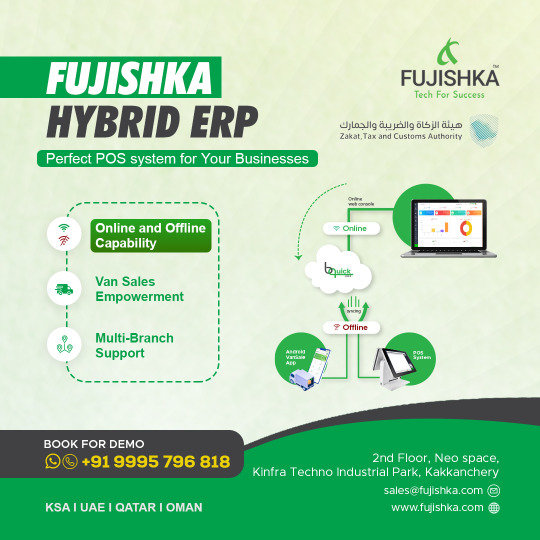
Best Cloud ERP in Saudi Arabia And Middle East
Fujishka Solutions is The best Hybrid ERP solutions
More Info: https://fujishka.com/
#erp systems#erp software uae#erp solution#erp implementation#ERP saudi arabia#saudi arabia#middle east#erp gcc
2 notes
·
View notes
Text

The healthcare industry plays an important role in society by offering people access to crucial medical services. These industries face several challenges that affect the healthcare industry’s capability to deliver cost-effective and efficient care. These problems, which range from regulatory difficulties to technological improvements, can have a significant impact on how healthcare is delivered and patient outcomes.
A good ERP solution unites all of the diverse parts of a complex healthcare organisation under a single roof. Each component is meant to work in tandem with the others, giving carers unrestricted access to all data across the organisation. Data can be shared across patient, pharmacy and clinician systems, as well as back-office administrative, personnel, and financial systems, allowing for better cost tracking and resource management.
#erp software#erp implementation#erp#healthcare#erp for small business#hospital erp software in saudi arabia
2 notes
·
View notes
Text

We develop supermodern real-time websites, e-shops and web applications. From simple microsites to complex system solutions.
We are bainry.
#realtime#website#ecommerce#application#web development#cms development services#crmsolutions#erp implementation#automation
2 notes
·
View notes
Text
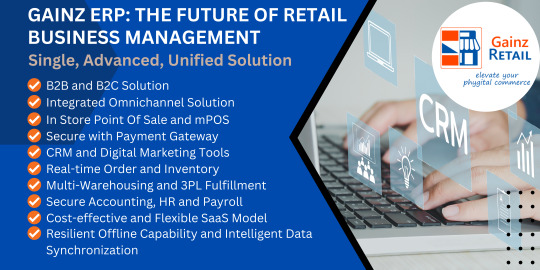
Gainz Retail ERP : The Future of Retail Business Management
We designed Gainz Retail ERP as an easy- to-use, retail business solution for in-store and online shopping.
Gainz Retail eliminates the hassle of maintaining multiple software for: POS - E-commerce - Accounting - Timesheet & Payroll
Let's show you how Gainz Retail ERP can manage your business with a single, advanced, unified solution.
for more details visit - https://www.odata.com/
#cloud erp#erp for small business#erp implementation#erp software#erpdevelopment#erpcompany#erp#erpsolutions#canada#sap erp#saas technology#saas application development#saascompany#saas software#saas app development company#retail pos software#retail store#retail business#retail erp software
2 notes
·
View notes
Text
Building an ERP System: A Comprehensive Step-by-Step Guide
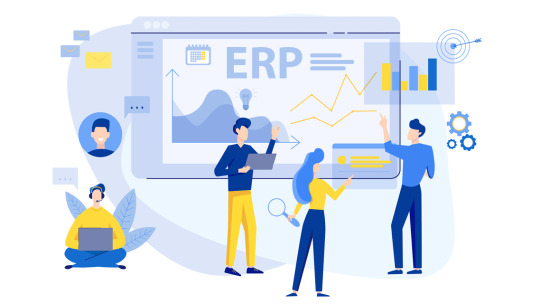
#application#development#software#software development#erpcloud#erp implementation#erp software#erp consultant#sap erp
2 notes
·
View notes
Text

Contetra offers end-to-end ERP implementation solutions tailored to a business's specific needs. Their approach focuses on streamlining finance, operations, and compliance by selecting the right ERP platform, mapping real business processes, and ensuring smooth rollout. From creating BRDs and setting up configurations to integrating workflows and training users, Contetra’s team—including experienced ERP functional consultants—ensures your system is scalable, efficient, and aligned with business goals.
#erp implementation system#erp functional consulting services#erp implementation consultants#erp functional consulting#erp system#erp functional consultant#erp implementation
0 notes
Text
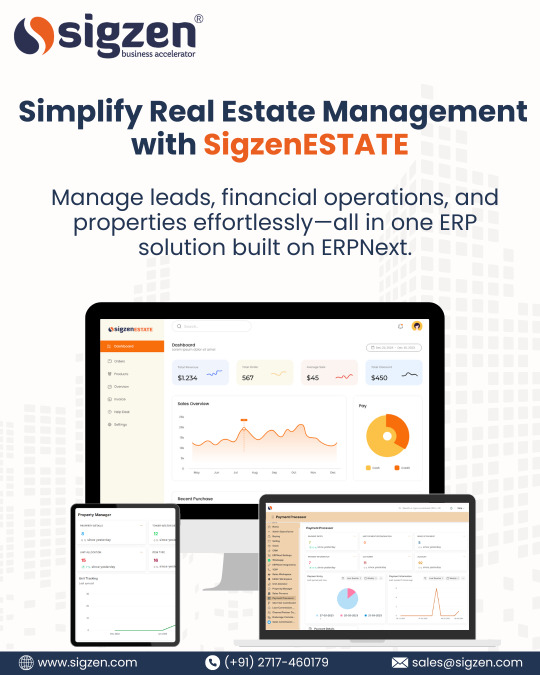
🏢✨ Simplify your real estate operations with SigzenESTATE – your all-in-one ERP solution powered by ERPNext! From managing leads to streamlining finances and property details, we've got it all covered. Effortless, efficient, and built for success. 💼💡
📊 Everything you need, all in one smart dashboard. 📞 Ready to transform the way you work? Let's connect!
#RealEstateManagement #ERPNext #SigzenESTATE #PropertySolutions #BusinessSimplified #TechForRealEstate #DigitalTransformation #SmartBusinessTools #RealEstateERP #SigzenSolutions
#erpnext#business growth#erp implementation#businesssolutions#business software#erp software solutions#real estate prosperity#real estate management#real estate#property solutions
2 notes
·
View notes
Text
#erp software#erpnext module#erp implementation#businesssolutions#crm software#erp system#cement#construction
2 notes
·
View notes
Text
#erp#erp software#erp system#erp implementation#erp solutions#erp integration#erp development company#cloud erp#erpsolutions#erp for manufacturing
0 notes
Text
Expert Odoo Implementation Services

🔧 Unlock Your Business Potential with Expert Odoo Implementation!
🚀 Say goodbye to inefficiencies and hello to streamlined processes. With our Odoo Implementation Services, we ensure your business gets the perfect setup for success.
🎯 What We Offer:✅ Customized Odoo solutions tailored to your needs. ✅ Hassle-free setup and seamless integration. ✅ Comprehensive training and 24/7 support.
💼 Whether you're upgrading from outdated systems or starting fresh, we’ll guide you every step of the way to maximize your ROI.
🌟 Ready to transform the way you work? Let’s make it happen together!
📩 DM us or visit https://www.candidroot.com/odoo-implementation to schedule a consultation today.
#OdooImplementation #OdooERPImplementation #OdooImplementationServices #BusinessSolutions #ERPExperts #DigitalTransformation #Odoo #CandidRootSolutions
#odoo#odoo implementation#odoo erp implementation#odoo implementation services#erp experts#erpsoftware#erp system#erp implementation
0 notes
Text
Budgeting for Odoo: Which Features Should You Prioritize?
When businesses consider implementing an ERP (Enterprise Resource Planning) solution like Odoo, the first question that often arises is: "What is the cost of Odoo implementation?" Because Odoo implementation costs vary depending on a number of criteria specific to each organization's needs, the answer is not always clear-cut. End-to-end Odoo implementation services are our specialty at Confianz Global Inc., and we're here to help you understand the factors that affect Odoo implementation prices.
Requirement Gathering and Business Analysis
Every successful Odoo implementation begins with a comprehensive understanding of the client’s business model, processes, and goals.
Cost Feature:
Time and effort spent by business analysts and consultants
Workshops and documentation to align Odoo modules with business needs
Functional gap analysis
Why It Matters: This phase prevents misalignment later, saving time and cost down the line.
Odoo Licensing Costs (Enterprise vs. Community)
Odoo offers two editions: Community (Free) and Enterprise (Paid). The cost structure depends on the version chosen.
Cost Feature:
Odoo Enterprise license fee is subscription-based (per user, per month/year)
Extra cost for apps/modules that aren’t free
Community version avoids licensing cost but may require custom development
Why It Matters: Choosing the right edition impacts the overall budget and system capabilities.
Module Selection and Configuration
Odoo consists of several modules like Sales, CRM, Inventory, Accounting, Manufacturing, etc.
Cost Feature:
Cost depends on the number of modules needed
Custom configuration of each module for business use
Time taken for workflow setup and permissions
Why It Matters: The more modules you use, the higher the configuration time and cost. However, it also maximizes ERP value.
Customization and Development
Most businesses require some level of customization to align Odoo to their specific processes.
Cost Feature:
Cost of developing new features or modifying existing ones
Integration with third-party tools (like payment gateways, e-commerce platforms, etc.)
API development for data synchronization
Why It Matters: Customization ensures the ERP fits your operations, but it's a major cost driver.
Data Migration
Migrating data from legacy systems into Odoo is a crucial and cost-intensive task.
Cost Feature:
Complexity and volume of data to be migrated
Data cleaning, mapping, and validation processes
Automated scripts or manual entry requirements
Why It Matters: Accurate data migration is key for ERP success and reduces disruptions.
Training and Change Management
Your team needs to know how to use Odoo effectively for maximum ROI.
Cost Feature:
End-user training sessions
Admin or super-user training
Creation of documentation and manuals
Why It Matters: Training ensures adoption, which directly affects the implementation’s success.
Support and Maintenance
Once Odoo is live, regular support is essential for smooth operations.
Cost Feature:
Bug fixes and performance optimization
Periodic updates and security patches
SLA-based support packages
Why It Matters: Ongoing support ensures stability and minimizes downtime costs.
Hosting and Infrastructure
Depending on whether you choose cloud, on-premise, or Odoo.sh, infrastructure costs will vary.
Cost Feature:
Cloud hosting (AWS, Google Cloud, Odoo.sh, etc.)
Server setup and maintenance
Backup and disaster recovery plans
Why It Matters: Infrastructure reliability directly affects ERP performance.
Project Management and Timeline
The larger and more complex your implementation, the more project oversight is needed.
Cost Feature:
Project manager fees
Use of project tracking tools
Agile or waterfall implementation methodology costs
Why It Matters: Efficient project management helps keep costs in control and ensures timely delivery.
Why Choose Confianz Global Inc. for Odoo Implementation?
At Confianz Global Inc., we bring years of expertise in Odoo ERP implementation across industries like manufacturing, retail, services, and healthcare. Here’s what you get when you work with us:
✅ Transparent and competitive pricing
✅ Certified Odoo consultants and developers
✅ Agile project execution with clear timelines
✅ Scalable solutions tailored to your business
✅ U.S. based project management and global delivery model
Final Thoughts
The cost of Odoo implementation is multifaceted and depends on your business size, complexity, and requirements. By understanding each cost element—licensing, customization, data migration, training, and more—you can make informed decisions and maximize your ROI. Confianz Global Inc. is here to guide you through the process from start to finish, ensuring a seamless transition to one of the most powerful ERP systems available.
0 notes